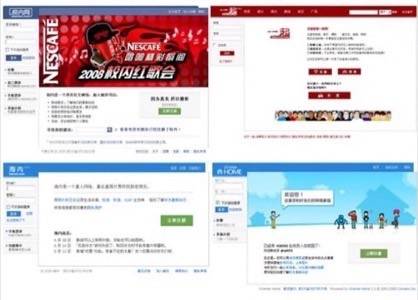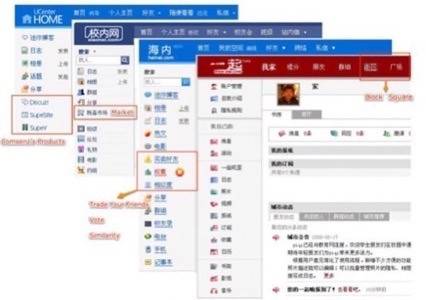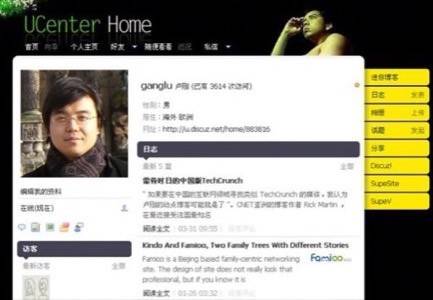Facebook has launched a Japanese version and a Chinese version (the latter announced this week). However, many Facebook clones have been in operation in China for a long time. So whether Facebook has an official presence in China does not really matter for millions of Chinese users. Perhaps you are bored with these China copycat stories. However if we study in depth these Chinese Facebook clones, as we will do in this post, they are more innovative and colorful than meets the eye.

Many of the sites below started out as simple clones, but they have each developed their own identity.
The most well-known Facebook copycat is Xiaonei.com. It was like a simplified version of Facebook in Chinese when it was first launched. The same layout, same colour scheme and even a very similar logo made people wonder if there was an official connection with Facebook. Xiaonei was bought by Oak Pacific Interactive, which recently sold its approximately 35% share to Softbank for $430 million.
Of course, it was not only Xiaonei that copied the design of Facebook. The latest development in the Facebook clone market is a new look-a-like called Yiqi.com – created by Wen Xie, former CEO of Yahoo China and a very influential veteran in China’s Web. Also check out UCenter, a customizable Facebook clone developed by Comsenz. The lastest stats from Comsenz is that over 50,000 UCenters have been set up, only 3 months after its release.

Change and Evolution
Similar layouts do not mean these Chinese Facebooks function the same as the real Facebook. Being an online social network for Chinese people, it has to understand the Chinese social culture. Xiaonei released a feature called Market, where you can sell and buy second hand things. The second-hand market is an event almost every student union has to organize at least once every semester in Chinese universities.
UCenter has integrated with Comsenz’s other products, such as BBS (bulletin board system) product Discuz!. If you know how popular BBS is in China, you would not be surprised that the number of installations of UCenter soars everyday.
Yiqi is trying to tell users that their real life can be reflected on the online world. In Yiqi, you can find features such as Block, Square, Newspaper etc.
I took screenshots of the top menu and side bar of all these sites. It is very interesting to see that the features on each site are different and have been well localized, which actually reflects the change and evolvement of Chinese Facebooks.

Vertical Social Networks
How many social networks should a user register for? If your friends are on new social networks, you will soon be invited and most likely will have to do registrations over and over again. Later you will receive some invites (application invites, event invites, etc) most of which you just are not interested in at all. What’s the value of joining so many generic SNS? China too has this problem. Enter the vertical SNS.
Hainei was founded by Xing Wang, who was also the co-founder of Xiaonei. Xiaonei has become a Facebook focusing on the Internet industry vertical. On Hainei, most of the users are linked to the Internet industry, which in this case means it doesn’t have an active Female user base.
5GSNS was founded by Keso, the most influential Chinese blogger. It is built on UCenter and is a social network helping users find a job in the IT industry (see screenshot below).

Distributed Facebooks
Comsenz’s Discuz! BBS platform dominates 70% of the Chinese online forum space. UCenter can be bundled with Discuz!, and together they could become a standard for many Chinese web sites. Whereas the western world Facebook is trying to aggregate all applications into one place, in China many mini Facebooks are distributed and fully controlled by users. I should also mention that UCenter supports Themes, which means that they may end up not being Facebook look-a-likes (see screenshot below).

Conclusion
Debating the copycat model of the Chinese Internet market is getting boring; Facebook’s official impact on China is still an interesting question, but there are many more options available to the Chinese social network user. SOHU, the top Chinese portal, partnered with Netvibes for its open blog platform in Oct 2007 [disclosure: Gang Lu works for Netvibes] , a sign of the Chinese Internet embracing the Open concept. The latest news is that several popular local SNSs – including Xiaonei, Hainei, Yiqi – have joined Google OpenSocial. Rumour has it that Sina and QQ are planning their own open platforms too.
Indeed the Open Platform is now one of the hottest topics in China. The question remains though: how will Chinese users respond to open SNSs and will any of the local Chinese social networks go global?










